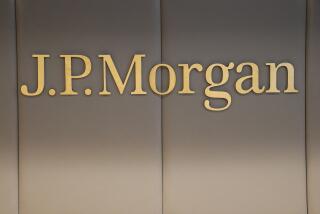Schwab case shows pain of a bond market’s collapse on small investors
- Share via
As the government’s lawsuit against Goldman Sachs Group Inc. over mortgage-backed securities stirred an uproar, a case with a lower profile showed the pain that some small investors suffered in the collapse of the market for bonds tied to home loans.
In the less closely watched case, Charles Schwab Corp. agreed last week to pay $200 million to settle a class-action lawsuit stemming from brutal mortgage-related losses in its once-popular YieldPlus bond fund.
In contrast to the Goldman matter, in which the victims were primarily European banks, the Schwab suit involved 250,000 individual investors who said they lost as much as $800 million.
And whereas the Goldman clients knew they were buying bonds dependent on the housing market, many of the Schwab customers say they had no idea that they were.
The lawsuit, as well as dozens of private arbitration cases, allege that Schwab misrepresented the risks of the supposedly conservative YieldPlus fund, primarily by stuffing it with dangerous mortgage-related securities.
“Part of reason we had this real estate bubble in this country … is because mortgage-backed securities were packaged in various forms as safe short-term instruments, which they weren’t, and sold to an unaware investing public,” said Brian Miller, a plaintiff’s attorney at Miller & Milove in San Diego.
In a statement, Schwab said the YieldPlus losses were caused by the unexpected convulsion of the credit markets during the financial crisis.
“We managed the fund in a clear and open way, followed standard practices and made all the right disclosures about the holdings,” Schwab said. “The losses were caused by an unforeseeable and once-in-a-lifetime almost total collapse in the financial markets.”
Schwab once pitched YieldPlus as a safe but higher-yielding alternative to money market funds, and its assets ballooned to more than $12 billion by mid-2007, according to fund tracker Morningstar Inc.
But the fund’s heavy mortgage-related holdings got pounded during the financial crisis. YieldPlus lost 35.4% in 2008, followed by a 10.5% decline in 2009, according to Morningstar. Investors stampeded out of the fund, which at last count had only $177 million in assets.
The losses, critics say, sprang partly from derivatives known as collateralized mortgage obligations.
Nearly 40% of the portfolio was in so-called private-label CMOs, according to Schwab. An additional 5% was in bonds backed by subprime home loans.
The CMOs were less arcane than the similarly named derivatives involved in the Goldman matter but nonetheless incurred steep losses, said Sam Edwards, a Houston investor attorney.
“You have the use of exotic investments that nobody understands, including the fund managers,” Edwards said.
The CMOs were issued by companies such as mortgage lenders Countrywide Financial Corp. and New Century Financial Corp., said Craig McCann of Securities Litigation & Consulting Group Inc., who has testified as an expert witness in several arbitration cases against Schwab.
“None of those private-label CMOs should have been in the fund,” McCann said.
Schwab countered that the fund’s holdings “were common, conservative, industrywide investments held by most bond funds.”
Investors also have claimed that YieldPlus, which Schwab marketed as a portfolio of very short-term securities, actually had many long-term holdings, exacerbating the losses. Schwab has disputed that assertion.
If approved by a judge, the class-action settlement would eliminate a daunting legal shadow for Schwab. Its stock rose last week after the announcement on apparent relief that the company wouldn’t have to pay more.
After legal fees, the settlement would give investors 20 to 25 cents for each dollar they lost.
In the separate arbitration cases, Schwab has paid out $48 million in settlements and awards. About 180 arbitration cases are pending. The company also faces a class-action suit in California state court.
More to Read
Inside the business of entertainment
The Wide Shot brings you news, analysis and insights on everything from streaming wars to production — and what it all means for the future.
You may occasionally receive promotional content from the Los Angeles Times.










